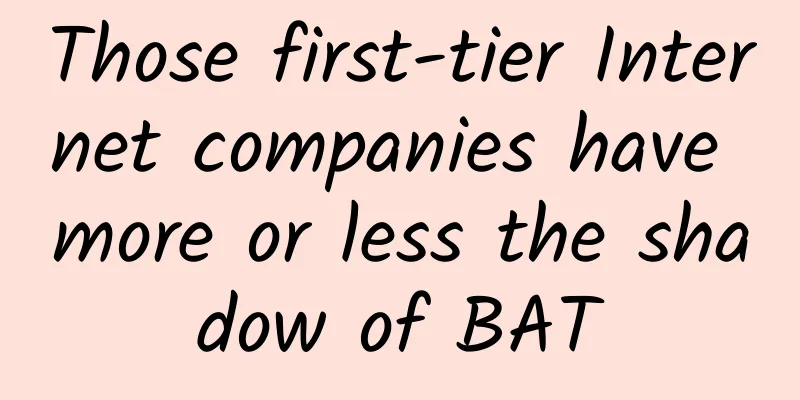Those first-tier Internet companies have more or less the shadow of BAT

|
With Youku Tudou handing over to Alibaba with a generous betrothal gift, the last independent player in China's online video industry has also stepped into the seclusion of the compound, and the ups and downs of the past decade have come to an end. It can be said that "the world is a dream and life is like the chill of autumn." Looking back at history, perhaps the decision of the industry pioneer Youtube to sell itself to the giant Google less than two years after its establishment was the truly decisive foresight. It indirectly acknowledged that even in a market like the United States, where the media industry occupies a leading position in the world, it is impossible to optimistically estimate the revenue balance figures. At that time, Netflix, the industry benchmark that would later become extremely popular, was still committed to delivering DVDs to users door-to-door. In China, 2005 and 2006 were the years when a large number of video websites were born. Youku, Tudou, Ku6, 56, 6Rooms, Ouou, PPS, PPLive and others were all established as start-up companies. The four major portals followed suit by relying on the "multimediaization of news information", which led to a boiling situation like the Spring and Autumn Period and the Warring States Period. When sorting out and reviewing, it is not difficult to find that the UGC model represented by Youtube, the PGC model represented by Hulu and the IP model represented by Netflix are exactly the three transformation benchmarks of their Chinese counterparts. Learn from history to understand the rise and fall of The first imitation and transplantation of Youtube was undoubtedly the most difficult stage for many Chinese video websites to make a living. The reasons for this have been determined in many ways: China does not have the traditional custom of home recording that the United States has, and has long lagged behind developed Internet countries in the construction of broadband levels. This makes it a very difficult job for users to contribute or receive video content. During this period, Hunan TV's "Super Girl" talent show was a big hit. A Tudou employee recalled that he went to the Hunan BD production team at that time, but was left in a hotel for nearly a week before being sent to the director's office to meet with an intern assistant. In the end, the negotiation failed. The other party found a TV clip of the Super Girls performance on the website and became furious, claiming that they would report to the newspaper and shut down "you unruly online media." Hulu's sudden rise in 2007 once proved the inherent advantages of traditional media genes. Behind Hulu, there are nearly 100 copyright content providers such as NBC, FOX, Disney, Warner Bros., MGM, etc. It ranked among the top ten video websites in the United States in terms of traffic within one month of its launch, and at the same time inspired a new but bloody way of survival for the Chinese market. The copyright war under the PGC model not only burned up the funds in the accounts of various companies, but also their persistent confidence, which objectively led to a reshuffle effect. In 2008, 6jianfang laid off all its employees, in 2009, Ku6 was sold to Shanda, in 2010, PPLive changed its name to PPTV and transformed into an online TV station, in 2011, 56 merged into Renren, and almost every year, a player who once kept pace with the competition quietly withdrew from the market, and the dawn of the survival of the fittest seemed to be coming. Unfortunately, those who see the light and hope to reap the rewards are not only the tired runners who think it is time for the long-distance sprint, but also the capital-backed giants who are eyeing the market covetously, such as Baidu, Tencent, Sohu and LeTV's refurbished entrants - they have all redefined and raised the strategic position of video projects - aiming directly at the first concept stock of China's online video. Among them, Tudou's "bloody IPO" and its merger with Youku before it lasted more than half a year can be called a tragic hero. At this time, although the practice of video websites to purchase copyrights on a large scale solved the problem of content supply from the source, they were still trapped in the narrow profit channel and could not resist the surge in costs. The third great gift from the United States is the success of "House of Cards", which not only promoted Netflix's big data myth, but also an IP-based industrial chain operation. As we all know, whether it is pre-roll advertising, paid viewing, or even movie ticket sales, compared with the huge capital flow of the cultural and entertainment industry chain, the online part can only get the leftovers at the end of the industry chain. The main reason is that the substitutability is too high, and online video is just a supplement to the long tail. However, what if we enter the content product distribution stage from the beginning? The answer to this question is also the concept of "Internet +", that is, the output value of pure Internet has reached its limit after years of mining - except for the game business, which is a business built in a virtual environment - if we want to find a bigger gold mine, we should not think about subverting traditional industries, but embrace traditional industries and extend our tentacles to the production link. Self-made IP has thus become a powerful lifeline. Its form has evolved from vloggers to micro-films to self-made dramas. Although it has not yet reached the level of "House of Cards" which is no different from the traditional production process, it is in line with the national conditions of China's mainstream Internet users. "Old Boy", "The Pancake Man", "One Hundred Thousand Bad Jokes" and "Never Expected" have landed on the theater screens one after another. At this time, the input-output ratio must be recalculated using the investment model, and the effect is naturally gratifying. There are many other favorable factors that have exploded during the same period, such as the consumption power of the fan economy, the hunger of Internet TV for content connections, the increasing popularity of smart hardware and VR technology, etc. However, trying to enjoy these potential dividends means that the role of online video companies must become complicated. Being too independent will prevent them from enjoying the high-quality resources built into the major factions. Therefore, even Youku Tudou, the marathon winner who persevered to the end, could not escape the fate. VC’s cold winter, BAT’s warm winter The essence of business is to make profits the first lifeline. If you ignore this and talk about feelings, you will only be labeled as hypocritical. However, today when capital mergers and acquisitions have become the norm, people still vaguely remember the years when selling oneself was considered a shame. Cao Guowei led Sina to use the "poison pill plan" to snipe Shanda's stock acquisition plan, which was at its peak at the time. Li Guoqing rejected Amazon's controlling proposal of "anywhere between 100 million and 1 billion US dollars" for Dangdang.com. Li Xueling ignored Tencent's proposal to return double the shares after the acquisition of Huya and turned his friend into an enemy. The endings of these stories may be difficult to tell, but it is only in such a world that the world seems to be treacherous and full of variables. The reason why entrepreneurship has changed from a regular meal to a fast food is that the average life expectancy is shortening. People are refreshing their mobile app lists faster and more frequently. Unlike many PC products that can survive for five or even ten years, the life cycle of mobile products has begun to show signs of a "black swan", which makes the panic of missing the selling price and being unable to get rid of the tail run through. Moreover, the hot money rolling in the capital boom has left many startups with no premium space for valuation after multiple rounds of financing. Even if they go public, their growth is limited. If the returns are similar, it is better to choose a lower-risk and more convenient way of selling. Buyers are equally fearful. "M&A is courting death, and not doing M&A is waiting for death. But courting death may succeed, and not doing M&A may not be your business." Chen Hong, CEO of Hanergy Investment, a financial advisor who participated in Tencent's investment in Sogou and acquisition of Shanda Literature, described his clients' mentality in this way. In fact, regarding Alibaba's love for taking over Youku Tudou, the brokerage firm's sensitivity is even higher than the company's internal decision-making. At the end of last year, Jack Ma met with executives from several Hollywood film companies in the United States, hoping to enrich Alibaba's content ecosystem. Wall Street expected that Jack Ma was trying to take over the film and television supply chain of more than one-third of Chinese consumers. The details here are that, despite the voices of capital winter and entrepreneurial bubble, compared with the prosperity of the Internet, the sluggishness of the real economy still forces hot money to the entrepreneurial field, and judging from the situation of taking over, the current success rate of venture capital is not too low, but too high. For example, Star VC entered the market midway, and half of the investment projects have successfully completed the next round of financing. This does not mean that entertainment stars will not have good results when they cross over to invest, but in this field with extremely high professional thresholds, if there are indeed no failure cases that have capsized in the gutter, then it can only mean one thing, that is, the largest imagination space is gathered here, which is why hot money with nowhere else to go flocks in and rarely suffers losses. On the other hand, the cash of the fund is limited. If the money in the front is not recovered for a while, the back will naturally be stretched, so some VCs are not exaggerating when they say they are encountering a capital winter. However, the capital giants are not only in this pool. The strategic investment of "BAT" is more flexible and proactive than financial investment. Buffett said, "When others hesitate, I advance", which is just like the motivation of "BAT" to establish a leading position in the industry in one fell swoop. In short, in addition to online video, in recent years, "BAT" has almost circled all explicit and implicit high-value-added fields through investment and mergers and acquisitions. The major entry positions are as follows: At the same time, American giants such as Google, Microsoft, and Facebook are actively investing in artificial intelligence, life sciences, virtual reality, drones and other fields. The differences between the Chinese and American markets have also caused the cognitive tracks of both sides to deviate further. Who is the mastermind behind stifling innovation? People often use the word "layout" to summarize investment and M&A cases, just like putting a stamp on an ink painting. However, the effect of "layout" often tends to be the ideal agenda of the giants. This dust-settled situation is actually not conducive to the incentive of innovation. A notable observation is that in the past two years, the job requirements of Internet companies have begun to shift from products to operations. The number of refreshing products has greatly decreased - even the frequency of short-lived popular products has become sparse - the key to determining the fate of enterprises has begun to fall on operational forces. According to statistics from 360 Mobile Assistant, nearly 70% of the top 500 applications in its distribution channels were launched before 2013 (including 9 of the top 10). The Matthew effect has led to a shortage of newcomers, and products such as 91 and UC have been assimilated after being absorbed by giants and have become lost in the crowd. Many mergers and acquisitions always dramatically reflect the political style of united front thinking, and the debate between independence and unification is extremely lively, especially when the acquired party insists on explaining "independent operation" and is very interested in clarifying the outside world's view that one will become less enterprising after marrying into a wealthy family. Say, the founder of industrial economics, believed that the criterion for innovation is whether there is a reorganization of order, which is consistent with Peter Drucker's definition of "creating new customers and new demands" in "Innovation and Entrepreneurship". The shopping carts of "BAT" are full of dazzling products, but they are for the purpose of stabilizing the current situation and consolidating themselves. Their capital investment will certainly be a great incentive for early entrepreneurship, but as long as the sugar-coated kills are waiting halfway, entrepreneurship will only become a gladiatorial arena for the "BAT" veterans to sit upright and watch seriously. Financial writer Wu Xiaobo has also called for vigilance against the phenomenon of "closing the country to the outside world" in the Internet field. He believes that the biggest hidden danger is that after "BAT" forms an oligopoly, users will truly lose the "second market", and when the market is unique, the harm of monopoly arises. In the final analysis, although China has hosted the "World Internet Conference", in terms of ecology - no matter how amazing the internal strength of this ecology based on the advantages of population and consumption - is, it lacks extension. Zhu Yuanzhang insisted on banning the sea, and Shen Wansan could only die in a foreign land. as well as…… As I was writing this, I happened to discuss this topic with a founder of a Series B startup. His answer may be representative: "Everyone who runs an enterprise wants to take their company public. As long as they have confidence in their business and have real strengths, it is possible to reject BAT, even if it means they become enemies. The question is what to do next. It is difficult for Chinese companies to survive in the US stock market without suffering losses. If they want to list in China, the A-share system is weird and unpredictable. The New Third Board is dead, and it is useless if they cannot raise money. In this environment and reality, how can we resist the real money beckoning of BAT?" This reminds me of what Peter Thiel said when answering the question “How to avoid the technology industry from entering a trough through investment”: “It is very difficult… When you buy stocks of Microsoft or Google or IBM or any large “tech company”, if you expect your investment to get a return, you are actually making a bet that there will be no better competitors. Only in this way can the stocks of these companies continue to rise. But if you hope to see more breakthrough technologies emerge, you should seriously consider this investment option.” |
<<: Ant Financial has become Ant-Man: Already a giant with no timetable for listing
>>: Cocos brings "Adventure and Mining" to both native and web games
Recommend
How to operate an event (Part 1)
In product operation, activity operation is also ...
Douyin Promotion: The most comprehensive guide to increasing Douyin followers
As the holy land of short video traffic, Douyin i...
Learn 3 tricks to easily promote your product
Product promotion does not necessarily require &q...
How do community apps stimulate users to produce high-quality content?
The product chain of a community product is: &quo...
How much does it cost to customize Zhoushan men’s clothing through the mini program? What is the price of customized men’s clothing through Zhoushan mini program?
The main factors affecting the price of mini prog...
5 common methods to improve user retention!
In the current context where it is difficult and ...
Android-6 steps to teach you how to customize View
If you plan to completely customize a View, you n...
Ground-based economy: the most traditional mode of operation and the most economical mode of attracting new customers
1. Team Building In terms of team building, the c...
Tips for developing a big Tik Tok account that attracts a lot of fans!
So what kind of influencers have more long-term a...
How to develop a Douyin mini program for funds? How many ways are there to develop a Tik Tok app?
How to develop a Douyin mini program for funds? H...
The last unknown blue ocean of Android emulator mobile games
Since the development of the mobile game market, ...
The secret to Tik Tok user growth!
Bright Dairy, a large traditional enterprise, ord...
Taking K12 products as an example, let’s talk about how to organize user internal testing activities
Before a product function is launched, the final ...
Understanding the “Identity” of AI Core in One Article
[[251095]] From the beginning of 2018 to the end ...
Analysis of Bilibili’s growth cases
The reason for dissecting this activity is that I...









